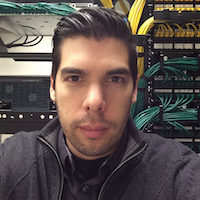
These testimonials should help you decide if either the Linux Foundation Certified System Administrator (LFCS) or the Linux Foundation Certified Engineer (LFCE) certification is right for you. In this latest installment, we talk with Chris van Horn, who recently passed the LFCS examination.
How did you become interested in Linux and open source?
Interest in Linux started in the late 1990s, my high school years. My math teacher taught an elective course in C programming and ran a Red Hat server that we would terminal into and use for compiling. That provided my first access to Linux, and things quickly escalated into Red Hat 5 installation attempts at home on my 386. Following high school, I began IT consulting for small local businesses, and the value of open source alternatives to costly enterprise software became a huge part of our conversations.
What Linux Foundation course did you achieve certification in? Why did you select that particular course?
I opted to start with Linux Foundation Certified System Administrator (LFCS) certification as it is currently more relevant to my career. I opted for certification more as a badge of support. I am a proud member of the Linux Foundation, and I see it as another way to promote both Linux and the foundation itself. However, I’m certain the next time I’m in the job market the certification will speak volumes.
What other hobbies or projects are you involved in? Do you participate in any open source projects at this time?
Current free time is spent coding bioinformatics and data visualization for my wife who works in the microbiology field. When that wraps up, I am looking forward to providing my skill set to open source projects in need. Specifically, to projects applicable to my own work such as containers, automation, and continuous integration.
Do you plan to take future Linux Foundation courses? If so, which ones?
Yes, specifically the topics where I have the most room for growth, such as embedded Linux development and developing Linux drivers.
In what ways do you think the certification will help you as a systems administrator in today’s market?
The certification has definite value when seeking employment. Seeing that an applicant has achieved either of the certifications says quite a bit about the level of experience and understanding required in the field. I’ve seen these results first hand; following the addition of the certification to my LinkedIn, there has been an increase in recruiter outreach.
What Linux distribution do you prefer and why?
I’ve always been a Debian-based guy. Debian is where I really dug into the advanced topics of Linux, and it just feels like home to me. I’ve always found the package manager easier to use, and stability was never in question. Plus, the usability of distributions like Ubuntu make it a top contender in my opinion when driving new user adoption.
Are you currently working as a Linux systems administrator? If so, what role does Linux play?
Although it isn’t the exact title I hold, approximately 30 percent of my day-to-day activities are as a Linux systems admin. I have many virtual systems up across various hosts/datacenters. Some of these Linux systems are production web servers, others are staging deployments, and others are development environments for our software engineers (continuous integration environments play a huge role).
Where do you see the Linux job market growing the most in the coming years?
I imagine most growth will come in the need for Linux sys admins with experience in containerized environments. The demand for the “DevOps” role is high at the moment, and I don’t see that declining anytime soon. Companies need system administrators who can not only keep the Linux host up and secure but also manage and maintain the development cycles in these environments for their dev teams.
What advice would you give those who are considering certification?
I would say to definitely practice; experience is key. Spin up a VM, take a fresh snapshot of it and go to work applying all the requirements of the exam in practice. When you feel you have satisfied all the exam topics thoroughly, apply that fresh snapshot to revert changes and begin again until it is second nature. Also, feel comfortable with man pages; they are your best friend when Google is not an option.
Read more:
Linux Foundation Certified System Administrator: Joshua Tang
Linux Foundation Certified System Administrator: George Doumas
Linux Foundation Certified System Administrator: Jorge Tudela Gonzalez de Riancho
Linux Foundation Certified Engineer: Francisco Tsao
Linux Foundation Certified System Administrator: Gabriel Canepa
Linux Foundation Certified Engineer: Michael Zamot
Linux Foundation Certified System Administrator: Ariel Jolo
Linux Foundation Certified System Administrator: Nam Pho
Linux Foundation Certified System Administrator: Steve Sharpe
